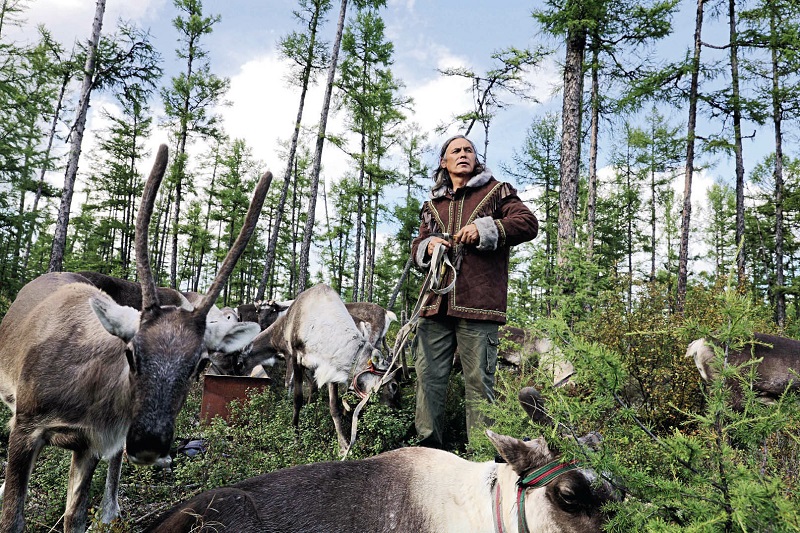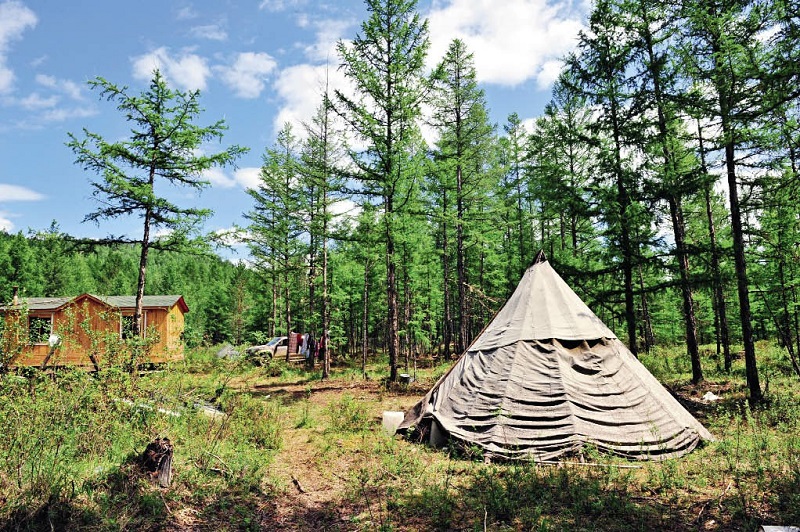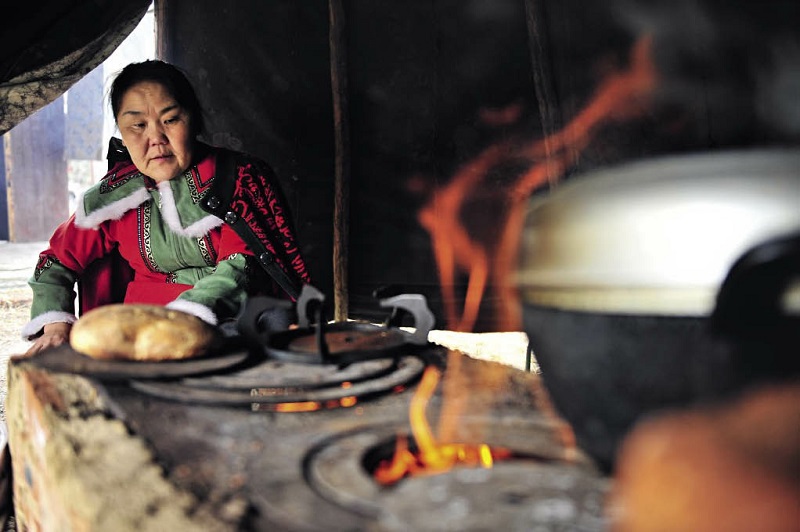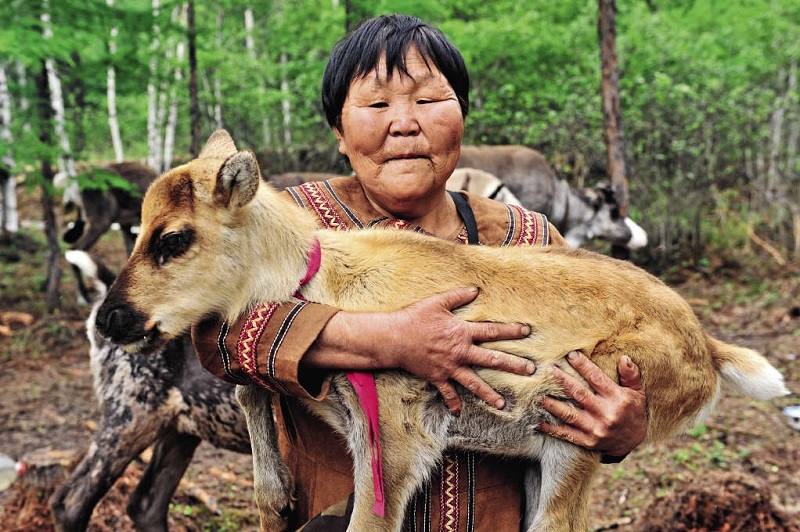
An Ewenki hunter Gu Dongjun surrounded by his reindeer in a virgin forest of Greater Khingan Mountains.
The Reindeer Ewenki in north China’s Inner Mongolia Autonomous Region is known as China’s only reindeer-using tribe that raises reindeer and preserves the culture of reindeer rearing. The reindeer herder community is special also because it jumped to the socialist system from their prior, relatively primitive traditional setup. According to generally agreed upon folk traditions, the Reindeer Ewenki people have a cultural history dating back nearly 3,000 years.
The reindeer culture created by the Reindeer Ewenki in Aoluguya Ewenki Ethnic Township, Genhe City, under the prefecture-level city of Hulun Buir, Inner Mongolia Autonomous Region, with their wisdom and diligence has a special status in the cultural milieu of the sub-frigid zone. Their special productive relations, daily life, marriage and family, social systems, and economic structures form a relatively complete cultural system.

A campsite of Ewenki near a forest.
Into Modern Life
Their abode for generations lay in the Greater Khingan Mountains, where winters are long and cold and the lowest temperatures can reach minus 50 degrees Celsius. However, the area is blessed with abundant resources. Before the 1950s, the Reindeer Ewenki people still maintained a unique self-sufficient rustic life, living on reindeer domestication and traditional hunting.
After the founding of the People’s Republic of China in 1949, they received strong support from the government, and their living conditions were greatly improved. In 1965, the reindeer herders stopped moving around, and gradually began to settle down.
With the acceleration of a modern civilization, the population and cultural environment of the reindeer-using community are undergoing tremendous changes. The over-exploitation of forest resources in the Greater Khingan Mountains for more than half a century and the promulgation of the Wildlife Conservation Law in 1989 made the hunting activities that they depended on for generations unsustainable. In 2001, the local government decided to relocate the ethnic groups so that they could lead a more secured life.
In August 2003, the first group of the Reindeer Ewenki people and their reindeer moved from the hinterlands to new homes in the outskirts of Genhe City, marking an end to the millennial old nomadic life.
No one knows the tribe better than centenarian Maria Suo. As chief of the reindeer-using tribe and the last matriarch in China, she is regarded by the tribe as a living totem. “Ewenki people value reindeer very much. Only with the reindeer, can we live at ease. Traditional Ewenki people only raise the reindeer, and do not kill, let alone eat them, because reindeer are our friends,” said Suo. Domesticated reindeer do not need to be attended by the people all the time. Herders go and find them when the animals are needed. The survival and reproduction of reindeer basically rely on the existing natural conditions. According to Suo, without the reindeer, there would be no Reindeer Ewenki people. In order to protect the forest and the reindeer, hunters do not use an open flame when smoking. Instead they chew smashed tobacco leaves.
In 2002, the local government built new homes for all 243 Ewenki people. The elegant buildings enabled the herders to live a comfortable and settled life, but Maria Suo, who has been accustomed to life in the mountains and forests, prefers the simple and peaceful life in the wild. In the end, she did not choose to live in the nursing home downhill, but stayed in the mountains and forests, remaining with the last vestiges of Ewenki reindeer culture.
There are many people who think the same way as Suo. In response to this situation, the government supported hunters to change their dwellings to prefabricated houses. The Ewenki people also have vehicles as an alternative means of transportation. The government equipped these herders’ homes with solar panels for power supply. With access to electricity, Suo’s home now has a refrigerator and a TV set, making her life much easier than before.

Suo Yulan, an Ewenki woman, is baking a local traditional staple food.
Prospering Tourism
In 2004, Aoluguya Ewenki Ethnic Township started to construct a tourism infrastructure, planning a tourist reception area, a folklore area, and five reindeer herding areas. In 2007, the government built the Reindeer-Using Tribe Scenic Area.
The reindeer has become a tourist draw. More and more tourists visit the place to catch a glimpse of the majestic animal and the unique Ewenki reindeer culture.
Over the last years, the place has been fully tapping into the potential of its reindeer culture under government support. It renovated tourist facilities, improved tourist services, and provided a full range of souvenirs for visitors. Among them are mostly handicrafts made from birch bark, reindeer antlers, and hides, presenting a take of Ewenki culture.
Tourism development has financially benefited local herders. By the end of 2019, the township had received 82,706 tourists, contributing a total tourism income of RMB 3.82 million.
Tourism has also helped poor herder families shake off poverty. In 2010, the local government invested RMB 700,000 in renovating the homes for 62 Ewenki households, providing them with LCD TV sets, sofas, beds, and new sets of bedding so that their homes are more attractive to tourists. Many herders gained a secured source of income from tourism thanks to the help.
“The forest is the home of Ewenki people,” said herder Bu Dongxia. Every time he receives tourists, he not only explains to them the reindeer culture, but also tells them the importance of protecting the forest. “Don’t smoke in the forest, and guard against fire when the weather is dry.” These are the words that every herder engaged in the tourism industry must say when receiving tourists.

An Ewenki woman named Liu Xia holding a reindeer cub.
Rescuing Cultural Treasures
Photos recording the history of the Ewenki people show shotguns, whistles, and birch bark boats the reindeer-using people used for hunting in the past. The hunting and Shamanism cultures created by the Reindeer Ewenki people over thousands of years are extremely unique, and are brilliant intangible treasures of Chinese ethnic groups.
As the Reindeer Ewenki people gradually put down their shotguns and walked out of the mountains, their living conditions have been improved. However, the reindeer have to live on uncontaminated lichen and water deep down in the primitive forests. The Ewenki people had to choose between a modern civilization and the reindeer culture. The older generation chose to return to the forest and preserve the ancient hunting culture together with the reindeer; while the younger generation followed the popular trend and gradually integrated into the modern life. Nowadays, there are few people from the older generation remaining in the mountains and forests, and the number of reindeer herders by profession is decreasing year by year. As a result, local people and their traditional culture are disappearing from people’s sight at an alarming rate.
This distinctive tribe has attracted special attention of scholars and the media in recent years. The development of local tourism also made its unique culture noticeable.
Aoluguya, a play featuring the life and culture of the Reindeer Evenki people, was staged in Beijing’s Poly Theater in 2010. Precious Ewenki cultural elements, such as original singing and dancing, rare ethnic musical instruments, and handmade costumes and accessories were all showcased in the theatrical production.
Genhe City holds the China Cold Pole Marathon event annually. Apart from thousands of runners from across the country, reindeer of the Ewenki tribe are also contestants of the event. The cold weather can always be warmed up by the enthusiastic competitors, who are flanked by crowds of spectators. It has become an occasion to soak into the exotic culture of the reindeer-using tribe.
The Reindeer Ewenki people are brave to leave the forests and embrace a new modern life. Their traditions and ethnic culture will not fade off, but be cherished by modern society and passed on to future generations.
WANG WEI is a freelance photographer.